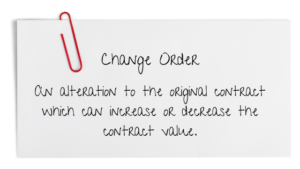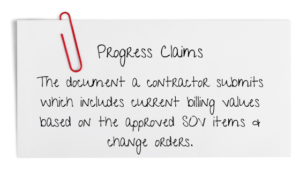There are many terms and acronyms you need to know when you’re part of Canada’s construction industry. We’ve put together the ultimate glossary so you can get familiar with 21 of the most common construction industry terms.
Addendum: An attachment to the original contract, used to clarify and add items.
Bid: A contractor or supplier’s submission, typically as part of a tender process.
Bill of Quantity (BOQ): A document that contains a list of materials and workmanship involved in your project. It is necessary for accurate pricing.
Change Order: An alteration to the original contract which can increase or decrease the contract value. Change orders would be new requirements that weren’t included in the original scope of work.
Compliance: Any item included in the original contract that a contract must provide, normally before the contractor is allowed to begin work on a job.
Typical compliance documents include: workers comp insurance, general liability insurance, umbrella insurance, auto insurance, pollution insurance, business license, supplier lien releases, signed subcontracts.
Construction Management Software: Software designed for construction managers to efficiently run a project – it might include features that manage payroll, workloads, or financials.
Contractor: Also referred to as the builder. Are responsible for the day-to-day oversight of the construction site, management of vendors and subcontractors. The general contractor considers the cost of materials, equipment and the cost of labour to provide the owner or developer with an approximate price for the project.
Developer: An individual or organization who acquires land and develops or redevelops it through construction.
ERP Integrations: The method by which a business connects its ERP (Enterprise Resource Planning) software with other applications. The objective is to share data across systems to improve productivity and insights and create a single source of truth.
Green Star Rating: Independent verification that a project’s design, construction and operation is sustainable.
GCPAY: A powerfully simple software that fully automates the process claim process between general contractors and subcontractors.
Holdback: A proportion of the final payment is ‘held back’ from the contractor until the client is satisfied that the work has been completed. In Canada, a basic holdback may be retained form the total project cost, released after practical completion. A finishing may then be retained from the value of the work left to be done, released after project completion.
Progress Claims: The document(s) a contractor submits which includes current billing values based on the approved schedule of values (SOV) items and approved change orders. In the US, progress claims are referred to as applications for payment or pay apps.
Progress Payment: A partial payment made to a business or contractor after the completion of a predefined stage of work. These installments replace other approaches, such as a single, lump-sum payment at the end of a project or a “half upfront, half at the end” arrangement.
Punch List: All the tasks that need to be completed on a project. This is typically compiled towards the end of the term, sometimes as the owner/client walks through the near-finished structure.
Schedule of Values: Detailed breakdown or list of items that will be included on the invoice. The value of these items ties to the total Original contract amount.
Stages of Construction: Concept; design and documentation; pre-construction; and construction, as reported on by BCI.
Statutory Declarations: Also called stat decs. Legal document that either unconditionally removes contractors ability to file a mechanics lien on a property.
Subcontract: A contract between a party to the original contract and a third party to provide products or services.
Subcontractor: An individual, hired by the primary contractor, who specializes in a specific aspect of the project. (Think: plumbing, electricity, painting, etc.)
Tier Contractor: Any contractor or supplier that is hired by a subcontractor to perform work or supplies to a construction site.
Zoning: A government regulation that involves restricting how a property is used.











